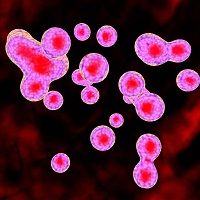Article
Patients with Ulcerative Colitis Who Receive a Stem Cell Transplant Are at Higher Risk for Deadly Opportunistic Infections
Author(s):
Study results show that patients with ulcerative colitis who undergo hematopoietic stem cell transplantation (HSCT) had higher rates of opportunistic infections and inpatient mortality compared to transplant patients who did not have UC.

Researchers reported at AIBD 2015 that patients with ulcerative colitis who undergo hematopoietic stem cell transplantation (HSCT) had higher rates of opportunistic infections and inpatient mortality compared to transplant patients who did not have UC.
Using data from the National Inpatient Sample (NIS) from the years 1993 t- 2012, researchers identified patients diagnosed with ulcerative colitis (UC) who underwent HSCT and matched them to a non-UC control group by age, sex, type of HSCT, source of stem cells, total body radiation, and other factors.
Opportunistic infections investigated included bacterial (tuberculosis, nocardiosis, clostridium difficile, pneumococcal, legionellosis, listeriosis, and nontuberculous mycobacteria), viral (cytomegalovirus, invasive herpes simplex virus), parasitic (toxoplasmosis), and fungal (pneumocystis jiroveci, invasive fungal infections).
The NIS sample included 50,330 patients who underwent HSCT, 98 of whom had UC and 95 had Crohn’s disease (CD).
Analysis of the data showed that patients with UC had a higher rate of inpatient mortality than non-UC patients (14.4% vs. 6.2%). UC patients who underwent HSCT also had a higher rate of opportunistic infections than non-UC patients (30.8% vs. 13.6%).
UC patients who underwent HSCT and had an opportunistic infection had higher rates of inpatient mortality than non-UC patients who did not get an infection (32.6% vs. 8.0%).
The number for patients with CD compared to non-CD patients were quite different. The researchers reported no difference in inpatient mortality between CD patients and non-CD patients. There was also no difference in the rate of opportunistic infections between the CD and non-CD patients.
Patients with UC had a higher risk of opportunistic infection compared to non-UC patients for both allogeneic and autologous stem cell transplant. UC patients who received allogeneic transplant were at higher risk for tuberculosis and cytomegalovirus than non-UC patients. UC patients who received autologous transplant had higher risk of invasive fungal infections than non-UC patients.
The researchers reported no difference in risk of any other kinds of opportunistic infection in UC patients as compared to patients without UC.
One limitation of this study identified by the authors was that patients who underwent HSCT “were not a randomized group of patients from the diseased or healthy population. Thus, we cannot exclude the possibility that UC patients who underwent HSCT were different from those who did not.”
They also noted that NIS data does not include information on long-term follow up for the patients undergoing HSCT.
Based on this data, the authors concluded that UC is associated with an increased risk of certain opportunistic infections in patients who undergo HSCT, and these infections are associated with “significantly higher odds of inpatient mortality in UC patients and may explain the increased mortality of UC patients undergoing HSCT.”




